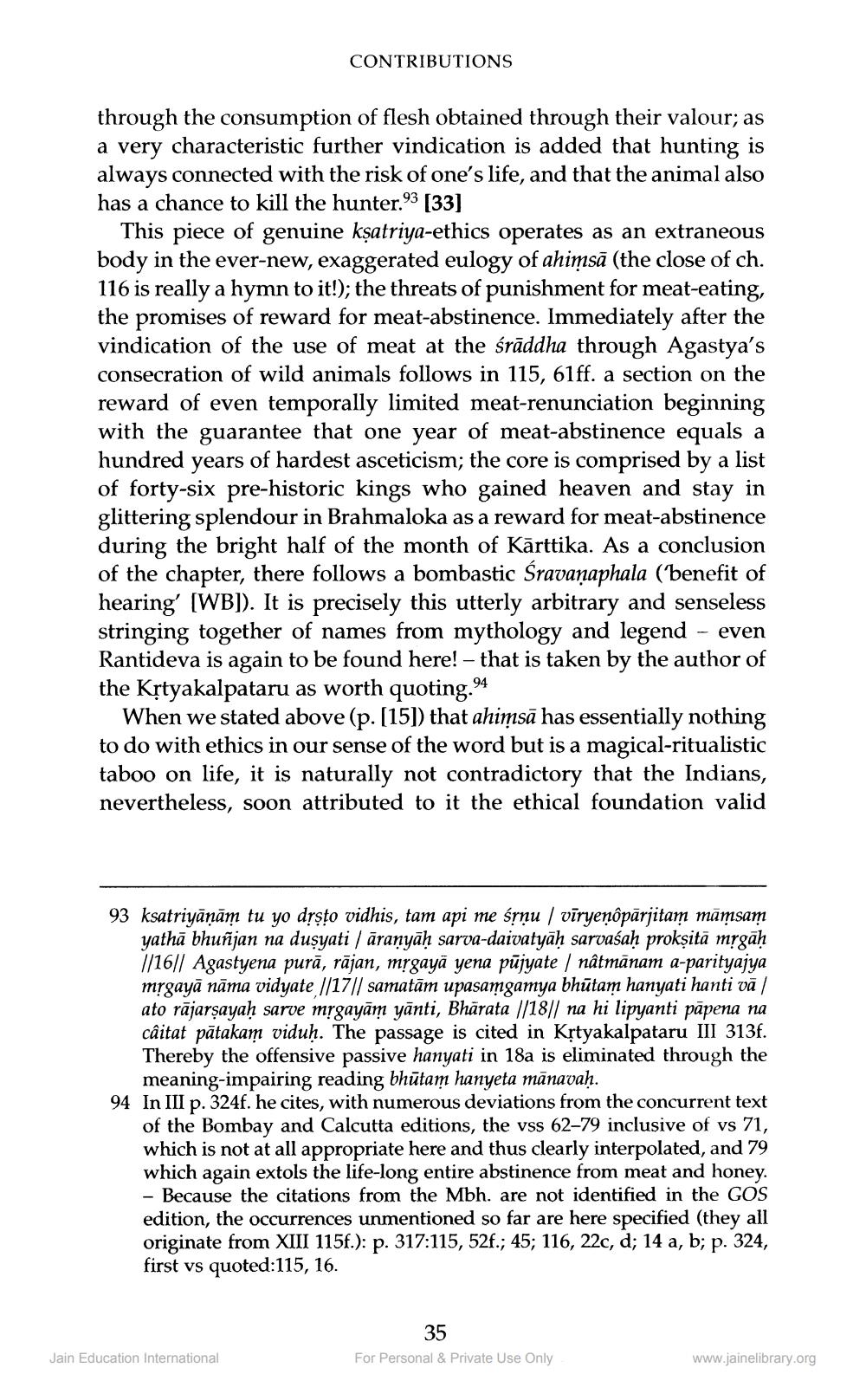________________
CONTRIBUTIONS
through the consumption of flesh obtained through their valour; as a very characteristic further vindication is added that hunting is always connected with the risk of one's life, and that the animal also has a chance to kill the hunter.93 [33]
This piece of genuine ksatriya-ethics operates as an extraneous body in the ever-new, exaggerated eulogy of ahimsā (the close of ch. 116 is really a hymn to it!); the threats of punishment for meat-eating, the promises of reward for meat-abstinence. Immediately after the vindication of the use of meat at the śrāddha through Agastya's consecration of wild animals follows in 115, 61ff. a section on the reward of even temporally limited meat-renunciation beginning with the guarantee that one year of meat-abstinence equals a hundred years of hardest asceticism; the core is comprised by a list of forty-six pre-historic kings who gained heaven and stay in glittering splendour in Brahmaloka as a reward for meat-abstinence during the bright half of the month of Kārttika. As a conclusion of the chapter, there follows a bombastic Śravanaphala ('benefit of hearing' (WB]). It is precisely this utterly arbitrary and senseless stringing together of names from mythology and legend - even Rantideva is again to be found here! – that is taken by the author of the Kệtyakalpataru as worth quoting. 94
When we stated above (p. [15]) that ahimsā has essentially nothing to do with ethics in our sense of the word but is a magical-ritualistic taboo on life, it is naturally not contradictory that the Indians, nevertheless, soon attributed to it the ethical foundation valid
93 ksatriyāņām tu yo drsto vidhis, tam api me srnu / vīryeņôpārjitam māmsam
yathā bhuñjan na duşyati / āranyāḥ sarva-daivatyāḥ sarvaśaḥ prokṣitā mțgāḥ 1/16|| Agastyena purā, rājan, mțgayā yena pūjyate / nâtmānam a-parityajya mrgayā nāma vidyate //17// samatām upasamgamya bhūtam hanyati hanti vā / ato rājarşayaḥ sarve mrgayām yānti, Bhärata //18|| na hi lipyanti pāpena na câitat pātakam viduḥ. The passage is cited in Křtyakalpataru III 313f. Thereby the offensive passive hanyati in 18a is eliminated through the
meaning-impairing reading bhūtam hanyeta mānavaḥ. 94 In III p. 324f. he cites, with numerous deviations from the concurrent text
of the Bombay and Calcutta editions, the vss 62-79 inclusive of vs 71, which is not at all appropriate here and thus clearly interpolated, and 79 which again extols the life-long entire abstinence from meat and honey. - Because the citations from the Mbh. are not identified in the GOS edition, the occurrences unmentioned so far are here specified (they all originate from XIII 115f.): p. 317:115, 52f.; 45; 116, 22c, d; 14 a, b; p. 324, first vs quoted:115, 16.
35 For Personal & Private Use Only
Jain Education International
www.jainelibrary.org




